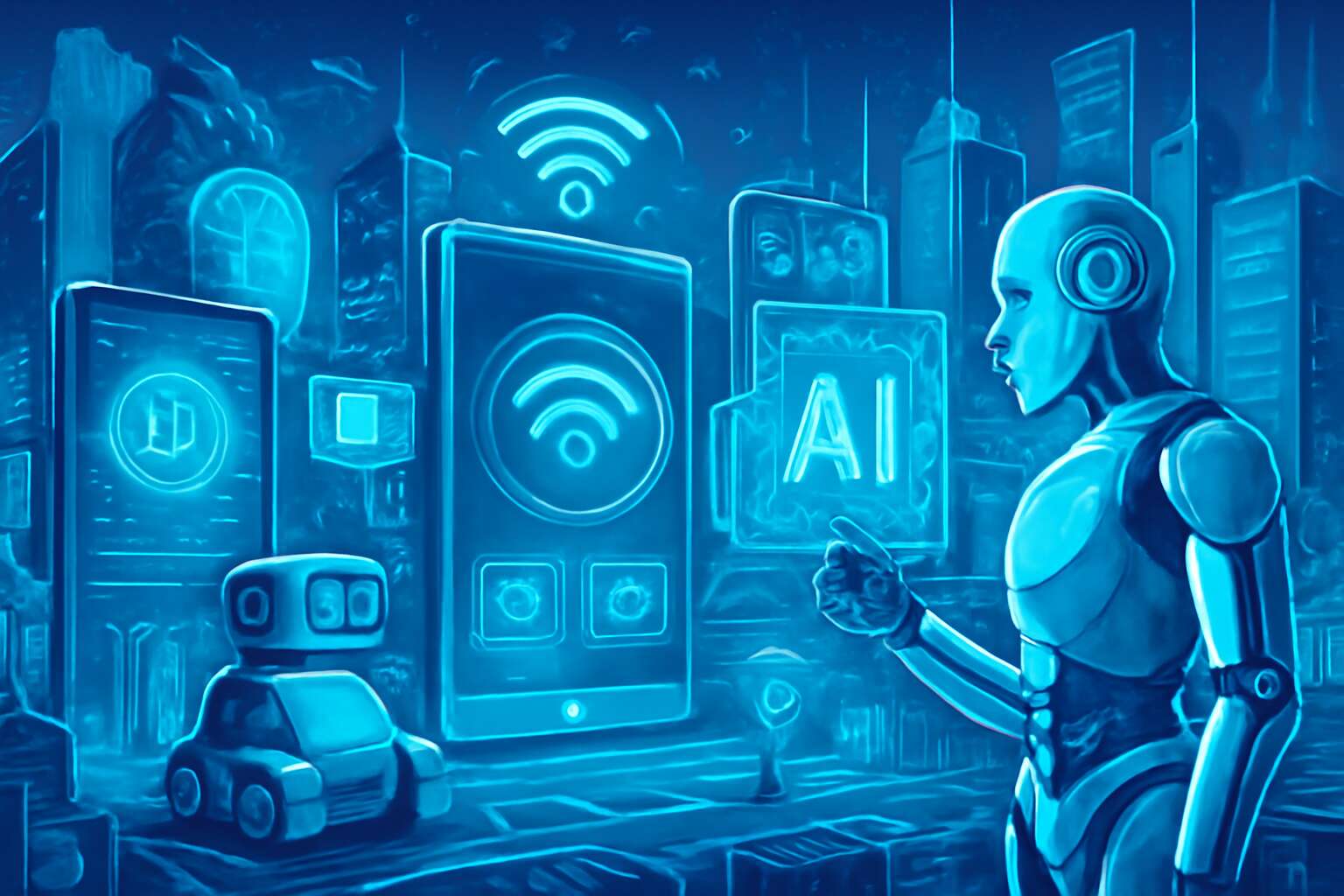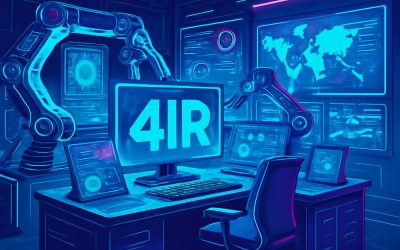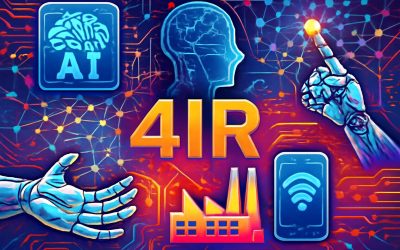Understanding Industry 4.0 and Artificial Intelligence
What is Industry 4.0?
Industry 4.0 marks a pivotal shift in how businesses operate, driven by the rapid integration of digital technologies. It isn’t just about automation; it’s about creating intelligent, interconnected systems that respond in real time. In South Africa, this transformation is opening doors for industries to enhance productivity and innovate faster. At its core, Industry 4.0 harnesses data to streamline processes and foster smarter decision-making.
Artificial Intelligence (AI) is the backbone of 4ir and AI. It enables machines to learn, adapt, and perform tasks once thought exclusive to humans. This synergy between AI and Industry 4.0 accelerates manufacturing, logistics, and even agriculture. For example, AI-driven analytics can predict equipment failures before they happen, saving costs and reducing downtime. As these technologies evolve, understanding their roles in 4ir and AI becomes essential for staying competitive in a rapidly changing market.
Defining Artificial Intelligence
Understanding Industry 4.0 and artificial intelligence is crucial as South Africa navigates this technological revolution. At its core, artificial intelligence (AI) refers to machines designed to mimic human intelligence—learning, reasoning, and adapting. Unlike traditional systems, AI can analyze vast amounts of data quickly and accurately, making it a cornerstone of 4ir and AI innovation. This capability transforms industries by enabling smarter decision-making and operational efficiencies.
AI’s role in 4ir is not limited to automation. It drives complex tasks such as predictive maintenance, supply chain optimization, and even agricultural management. For instance, AI-driven analytics can forecast equipment failures before they occur, saving costs and reducing downtime. To grasp the potential, consider these applications:
- Predictive analytics in manufacturing
- Automated quality control systems
- Intelligent logistics and delivery optimization
As 4ir and AI continue to evolve, understanding their synergy is vital for businesses seeking to stay competitive. The integration of AI into digital ecosystems is not just a trend but a fundamental shift reshaping how industries operate in South Africa and beyond.
The Evolution of Technology in Industry 4.0
Technology is advancing at an unprecedented pace, reshaping industries in ways we once only imagined. Industry 4.0, driven by the convergence of digital and physical systems, signifies a new era of automation and intelligent connectivity. Central to this revolution are 4ir and AI, which are transforming the South African business landscape. With AI’s ability to analyze vast data sets in real time, companies can now optimize operations, reduce costs, and innovate faster than ever before.
One of the most compelling aspects of 4ir and AI is their ability to enable predictive insights. For example, predictive maintenance is reducing downtime in manufacturing plants across South Africa, saving millions. These advancements are not limited to factories; they extend to logistics, agriculture, and even health services. As industries adopt these technologies, the line between digital and physical continues to blur, creating smarter, more responsive systems.
- Enhanced decision-making through real-time analytics
- Automation of complex tasks like supply chain management
- Development of adaptive, self-learning systems
Understanding the evolution of 4ir and AI is crucial for South African businesses aiming to stay competitive in this new digital age. This shift is more than a trend — it’s a fundamental change in how industries operate and grow in the modern world.
The Role of AI in Shaping the Fourth Industrial Revolution
AI as a Catalyst for Industry 4.0
Artificial intelligence (AI) has become the secret engine powering the Fourth Industrial Revolution (4IR). It’s no longer just a futuristic concept; AI is actively transforming industries around the globe, including South Africa’s dynamic landscape. With AI acting as a catalyst, the possibilities for innovation seem almost limitless. From predictive analytics that anticipate market shifts to autonomous machinery optimizing manufacturing, AI’s role in 4IR is profound.
What makes AI so pivotal? It’s the ability to turn vast data streams into actionable insights at lightning speed. This transformation is not merely about automation; it’s about creating intelligent systems that learn, adapt, and evolve. As 4IR and AI intertwine, businesses can unlock efficiencies, reduce costs, and foster new business models—an evolution that’s reshaping industries on a fundamental level.
In this new era, emerging technologies like machine learning, IoT integration, and robotics are united by AI’s core function—driving innovation.
- Enhanced decision-making processes
- Smarter supply chains
- Real-time data analysis
These advancements are more than buzzwords—they’re the blueprint for sustainable growth in a competitive world. Embracing AI within 4IR isn’t just a choice; it’s an imperative for those seeking to lead rather than follow in the digital age.
Key AI Technologies Driving Transformation
In the symphony of technological evolution, certain instruments strike a chord so profound that they redefine the very essence of progress. Among these, AI stands as the maestro orchestrating the crescendo of the 4IR and AI revolution. Its role in shaping industries is nothing short of transformative—turning raw data into a living, breathing entity that learns, adapts, and anticipates future needs. This isn’t mere automation; it’s the creation of intelligent systems that breathe innovation into every corner of business operations.
At the heart of this revolution lie key AI technologies that propel change at an astonishing pace. Machine learning algorithms sift through oceans of information, uncovering patterns that human eyes could never perceive. Internet of Things (IoT) devices weave a web of interconnectedness, providing real-time insights that redefine decision-making. Robotics, imbued with AI, perform tasks with precision and agility, pushing industries toward unprecedented levels of efficiency.
- Predictive analytics that foresee market fluctuations before they happen.
- Automated supply chains that respond dynamically to changing demands.
- Smart manufacturing systems that optimize processes on the fly.
Such technological marvels are no longer the stuff of science fiction—they are the very fabric of the 4ir and AI landscape in South Africa, forging pathways to sustainable growth and global competitiveness. As AI continues to evolve, its influence on industry becomes an indelible force, shaping a future where innovation is not just a goal but a way of life.
Real-World Applications of AI in Industry 4.0
In the shadowy corridors of progress, AI emerges as the unseen architect of the Fourth Industrial Revolution, casting a long, enigmatic glow over industries in South Africa. Its influence is felt not just in automation but in the subtle, almost poetic way it breathes life into data—transforming raw numbers into intelligent entities that learn and adapt with a silent, relentless purpose. This is no mere evolution; it is a metamorphosis that rewrites the very fabric of business operations.
Real-world applications of AI within Industry 4.0 are as diverse as they are profound. From predictive analytics that foretell market shifts before they surface, to automated supply chains that respond with almost prescient precision—AI shapes a future where efficiency dances with innovation. Robotics imbued with AI perform with a ghostly grace, executing tasks with an accuracy that borders on the supernatural.
- Smart manufacturing systems that optimize themselves in real-time, reducing waste and enhancing productivity.
- Intelligent sensors in IoT devices that offer real-time insights, enabling businesses to anticipate needs before they arise.
- Automated decision-making processes that streamline operations, freeing human minds to focus on creative pursuits.
In South Africa’s quest for sustainable growth and global competitiveness, AI’s role in Industry 4.0 is both a catalyst and a harbinger of a new era—one where innovation whispers through the shadows, forever altering the landscape of possibility.
Impacts of AI on Business and Society
Economic Benefits and Challenges
The dawn of the 4ir and AI has initiated a seismic shift across business landscapes and societal frameworks, especially in South Africa where innovation is both a necessity and an opportunity. AI’s transformative power fuels economic growth, unlocking efficiencies and new revenue streams that were once unimaginable. Yet, along with these benefits come complex challenges that demand careful navigation.
For businesses, AI offers a competitive edge—automating processes, enhancing decision-making, and fostering personalized customer experiences. Society, on the other hand, grapples with issues such as job displacement and data privacy concerns. It’s a delicate balance: harnessing the economic benefits of 4ir and AI while managing the societal risks. Some of these benefits include increased productivity and new job categories, but the challenges—like ethical dilemmas and technological inequality—are equally pressing.
- Economic growth through innovation
- Job market evolution and skills development
- Potential for increased inequality if not managed properly
- Enhanced societal services, such as healthcare and education
Understanding the impact of 4ir and AI on both business and society requires a nuanced perspective—one that recognizes the promise of technological advancements while preparing for their ripple effects. The future hinges on our ability to align these innovations with sustainable development goals, ensuring progress benefits all sectors of society.
Job Creation and Displacement
The dawn of the 4ir and ai has cast a luminous glow over the landscape of employment, transforming the very fabric of work in South Africa. As machines grow smarter and algorithms more sophisticated, the impact on jobs becomes a complex tapestry woven with both promise and peril. AI’s ability to automate routine tasks often leads to significant job displacement, yet it simultaneously paves the way for new roles and industries—a paradox that sparks both hope and concern.
In this new era, the job market is evolving rapidly. Traditional roles are being reshaped, while innovative positions emerge at an unprecedented pace. To navigate this terrain, many experts suggest focusing on skills development in areas like data analysis, machine learning, and digital literacy. These are the currencies of tomorrow’s workforce, and mastering them could be the key to thriving amidst the transformative wave of 4ir and ai.
Some regions and sectors may experience increased inequality if proactive measures are not taken. The divide between those who possess the technological skills and those who do not could widen, underscoring the importance of inclusive policies. Nevertheless, the potential for AI to augment societal services—such as healthcare and education—remains vast, offering hope for a more equitable future.
- Job creation in emerging industries fueled by AI innovation
- Displacement of roles rooted in routine and manual tasks
- Reskilling initiatives to bridge the digital divide
Ultimately, understanding the nuanced impacts of 4ir and ai on employment in South Africa requires a careful balance—one that recognizes the profound shifts happening now and prepares the workforce for a future where human ingenuity and artificial intelligence coexist harmoniously.
Enhancing Customer Experience through AI
In the relentless march of the 4ir and ai, the fabric of society is being woven with threads of unprecedented innovation. These technological currents ripple through business and community life, reshaping interactions and expectations in ways both subtle and profound. One of the most immediate and tangible impacts is the transformation of customer experience—where AI-driven solutions elevate service standards to levels once deemed science fiction.
Businesses leveraging AI in South Africa are now able to personalize interactions at an individual level, creating a seamless and intuitive engagement. From chatbots that anticipate client needs to predictive analytics that optimize supply chains, AI acts as an invisible hand guiding both strategy and service delivery. This not only fosters loyalty but also boosts operational efficiency, making companies more agile in a competitive landscape.
- Enhanced responsiveness through AI-powered customer support
- Data-driven insights enabling targeted marketing and product development
- Automation of routine tasks freeing up human talent for complex problem-solving
As AI continues to weave itself into the societal fabric, its influence extends beyond commerce. It catalyzes societal progress by enabling smarter healthcare systems and educational tools that adapt to individual needs. In South Africa, where disparities persist, the promise of AI to bridge divides is both a challenge and an opportunity—if harnessed with care and foresight. The impact of 4ir and ai, therefore, is not just about technological advancement but about fundamentally redefining the relationship between humans and machines in pursuit of a more connected, efficient, and equitable society.
Ethical Considerations and Data Privacy
The rapid ascent of 4ir and ai has ignited a seismic shift in both business and society, bringing unprecedented opportunities—and profound ethical dilemmas. As AI systems become more sophisticated, their impact extends beyond efficiency, touching on core human values and societal norms. The question is no longer just about technological potential, but about the moral compass guiding its application.
One of the most pressing issues is data privacy. With AI-driven insights relying on vast pools of personal data, safeguarding individual privacy becomes paramount. In South Africa, where disparities and vulnerabilities are pronounced, mishandling data can deepen societal divides or erode trust. Businesses must navigate this landscape carefully, balancing innovation with ethical responsibility.
Consider this: AI’s influence isn’t just about automation but about redefining societal relationships. From ethical considerations surrounding AI decision-making to ensuring transparency in algorithms, each step demands vigilance.
- Respect for individual privacy
- Accountability for AI-driven decisions
- Fairness in algorithmic outcomes
These principles are critical for harnessing the full potential of 4ir and ai while maintaining societal integrity. It’s a delicate dance—one that requires foresight and integrity as we shape the future of human-machine collaboration.
Future Trends and Opportunities in 4IR and AI
Emerging Technologies and Innovations
As the dawn of the Fourth Industrial Revolution (4IR) and AI continues to unfold, the horizon is ablaze with unprecedented opportunities. Imagine a world where intelligent ecosystems dynamically adapt—where predictive analytics and autonomous systems forge paths into uncharted territories of innovation. The future of 4IR and AI promises to revolutionize not just industries but the very fabric of daily life, weaving technology into the tapestry of human endeavor with poetic grace and formidable power.
Emerging technologies such as quantum computing, edge AI, and bioinformatics are poised to redefine what is possible. These innovations will enable smarter cities, sustainable energy solutions, and resilient supply chains—each a testament to the ingenuity born from this digital renaissance. For South Africa, this means unlocking new economic corridors and fostering local talent in ways that once belonged solely to the realm of dreams.
Looking ahead, the landscape of 4IR and AI will be shaped by a confluence of policy, innovation, and human resilience. As opportunities blossom, so do the challenges—demanding a thoughtful balance between progress and responsibility. Truly, the future is a symphony of potential, waiting to be conducted with vision and purpose.
The Role of Governments and Policy Making
The future of 4IR and AI is not merely a digital evolution but a profound reimagining of societal and economic paradigms. As emerging trends unfold, government policies will play a pivotal role in shaping this new frontier, ensuring the technological tide lifts all boats rather than leaves some behind. Strategic regulation and forward-thinking legislation can catalyze innovation while safeguarding ethical standards and data privacy, fostering an environment where technological advancements serve the collective good.
In South Africa, this delicate balance between progress and responsibility is especially critical. Governments must craft adaptive policies that encourage local innovation, support startups, and attract foreign investment in AI-driven industries. By establishing clear frameworks, they can unlock new economic corridors and stimulate job creation—yet remain vigilant against potential displacement. The landscape of 4IR and AI demands not only visionary leadership but also inclusive dialogue among stakeholders.
- Developing robust legal frameworks that promote innovation without compromising privacy
- Investing in education and reskilling initiatives to prepare the workforce for AI integration
- Encouraging public-private partnerships to accelerate technological deployment in vital sectors
As these elements intertwine, the trajectory of 4IR and AI becomes a complex symphony—an intricate dance of policy, ingenuity, and resilience. The opportunities are vast; the stakes are high. With mindful stewardship, South Africa can harness these technologies to forge a resilient, inclusive future—where progress is both sustainable and equitable.
Preparing the Workforce for the Era of AI
As South Africa stands on the cusp of an exhilarating transformation, the future trends in 4IR and AI promise to redefine the very fabric of our society. The integration of these technologies offers unprecedented opportunities—yet, it also demands a recalibration of our workforce strategies. Preparing workers for this new era isn’t merely about technical training; it’s about cultivating adaptability and resilience in the face of rapid change.
Emerging sectors will require a blend of digital literacy and innovative thinking. Governments, educational institutions, and industries must collaborate to develop comprehensive reskilling initiatives. These programs will empower individuals to navigate the complexities of AI-driven workplaces and seize new economic opportunities. The challenge lies in ensuring that no one is left behind as automation and intelligent systems become ubiquitous.
- Investing in lifelong learning platforms tailored to AI competencies
- Fostering entrepreneurial spirit to capitalize on 4IR and AI innovations
- Creating pathways for youth and marginalized communities to participate actively in the digital economy
Such strategic focus can unlock the full potential of 4IR and AI, transforming South Africa into a resilient hub of innovation. As the symphony of technological progress plays on, the harmony between human ingenuity and machine intelligence will define the emerging landscape—where opportunity and responsibility dance in tandem, shaping a future that is inclusive and sustainable. The journey is complex, but with deliberate foresight, the rewards are boundless.
Challenges and Risks of AI in Industry 4.0
Cybersecurity Threats
In the dance of progress that is 4IR and AI, shadows lurk behind every luminous stride. As industries embrace the luminescence of innovation, they often overlook the lurking specter of cybersecurity threats. These digital phantoms, if left unchecked, can transform swift technological leaps into catastrophic setbacks. The very interconnectedness that fuels 4IR and AI magnifies vulnerabilities, creating a labyrinth of potential entry points for malicious actors.
Cybersecurity threats in this realm are not mere inconveniences—they threaten the very fabric of modern manufacturing, logistics, and financial systems. Hackers, like cunning predators, exploit weak links—be it outdated software or insufficient safeguards. To safeguard this new dawn, organizations must wield a layered armor of robust security protocols, constant vigilance, and adaptive defenses. Because in the relentless march of 4IR and AI, resilience is the true currency against the storm of cyber threats.
Bias and Fairness Issues
As industries accelerate into the realm of 4IR and AI, a shadow looms—bias and fairness issues threaten to undermine the very foundation of technological advancement. These challenges are not merely technical glitches; they are ethical dilemmas that can perpetuate inequality and skew decision-making processes. When AI systems are trained on biased data, they inadvertently reinforce stereotypes, creating a domino effect that can have serious societal repercussions.
In the context of South Africa, where diverse populations and socio-economic disparities are prominent, these biases can have amplified consequences. For example, recruitment algorithms or credit scoring systems powered by AI may unintentionally discriminate against marginalized groups, eroding trust and fairness in digital transformation initiatives. Addressing these biases requires vigilant oversight, transparent algorithms, and diverse data sets that truly reflect the complex fabric of society.
- Unchecked bias can lead to unfair employment practices.
- It may skew financial services, impacting economic equality.
- Persistent biases threaten the integrity of AI-driven decision-making processes in industry 4.0 systems.
Ultimately, tackling bias and fairness issues in 4IR and AI isn’t just about ethical responsibility—it’s about safeguarding the future of innovation itself. Resilience and trust in AI depend on our ability to confront these shadows head-on, ensuring the technological renaissance benefits all equally, without prejudice or bias.
Dependence on Technology
As South Africa embraces the era of 4IR and AI, the dependence on technology brings both promise and peril. While AI can revolutionize industries and uplift communities, it also introduces significant risks that are often overlooked in the rush to innovate. Overreliance on automated systems can lead to vulnerabilities—cybersecurity threats that could cripple critical infrastructure or compromise sensitive data. When AI drives decision-making without human oversight, errors or malicious manipulation can have far-reaching consequences, threatening economic stability and social cohesion.
This dependence becomes especially poignant in rural areas, where technological resilience is fragile. Disruption in AI-powered systems may mean a halt to vital services like healthcare or agriculture, which many communities rely on daily. To mitigate these risks, continuous monitoring and robust safeguards must be woven into the fabric of AI deployment in South Africa, ensuring that progress does not come at the expense of safety or societal trust.
Regulatory and Legal Challenges
The rapid ascent of 4IR and AI has unleashed unparalleled innovation, yet it also casts long shadows over the regulatory landscape. As industries harness the potential of AI, the legal frameworks that govern its deployment often lag behind technological advancements. This disconnect poses a fundamental challenge: how can policymakers craft regulations that protect societal interests without stifling innovation?
One of the most pressing concerns is ensuring accountability. When AI systems make autonomous decisions, assigning responsibility becomes complex. Should a malfunction cause harm, who bears the burden—the developer, the user, or the AI itself? To address this, regulators worldwide are exploring new legal paradigms, but the path remains fraught with uncertainty.
In South Africa, this challenge is compounded by the need to balance economic growth with social equity. As 4IR and AI reshape industries, creating a robust legal framework that encompasses data privacy, intellectual property, and ethical standards is crucial. Without it, the promise of AI risks descending into chaos, with potential risks including:
- Unclear liability and accountability
- Delayed regulatory responses to emerging AI risks
- Potential misuse or malicious manipulation of AI systems
Amidst these complexities, the importance of proactive, adaptable regulation cannot be overstated. It is a delicate dance—fostering innovation while safeguarding societal values—yet the stakes have never been higher in the era of 4IR and AI.




0 Comments